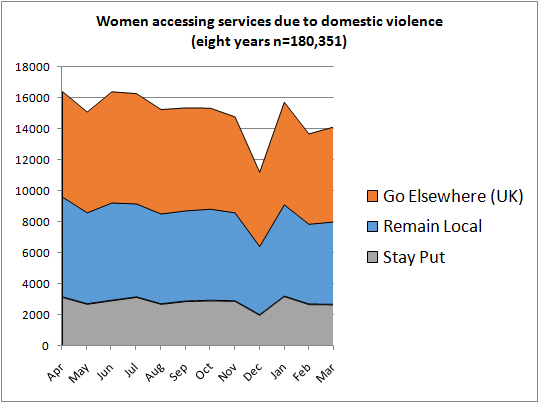Women experiencing domestic violence seek help all year round; whether it is advice and support to be able to stay put; or relocating to access services locally or further away.
Many factors affect the timing of seeking help.
Individual women may seek help at a time of extreme danger – or at a time of opportunity: it may be when a woman hears about support services or refuges, or is encouraged to believe that someone will help her.
Women are often not just seeking help for themselves – over half the women accessing services over an eight year period in England had children with them[1].
Women may or may not have an option about when and where to seek help – and if they try and access a service they may not find any space at a refuge, or may be put on a waiting list for an advice and support worker.
However, there is one clear pattern in women’s help-seeking month by month:

Whether women are staying put and seeking support, remaining local within the same Local Authority area, or travelling across boundaries to go elsewhere, the numbers dip in December.
Christmas in the UK is often celebrated as a time for families – with the restrictions this year being highlighted as preventing the kind of December that so many people expect.
However, help-seeking due to violence and abuse highlights another side of many women and children’s experiences in families – with December as a time of not wanting or not being able to seek help; and January as a time of reaching out or relocating for support.
Even so, thousands of women and children will be seeking help in December – with thousands more to come in January.
[1] Analysis by Janet C. Bowstead using data fromDepartment for Communities and Local Government and University of St Andrews, Centre for Housing Research (2012) Supporting People Client Records and Outcomes, 2003/04-2010/11: Special Licence Access [computer file]. Colchester, Essex, UK Data Archive [distributor]. Available from: http://dx.doi.org/10.5255/UKDA-SN-7020-1
